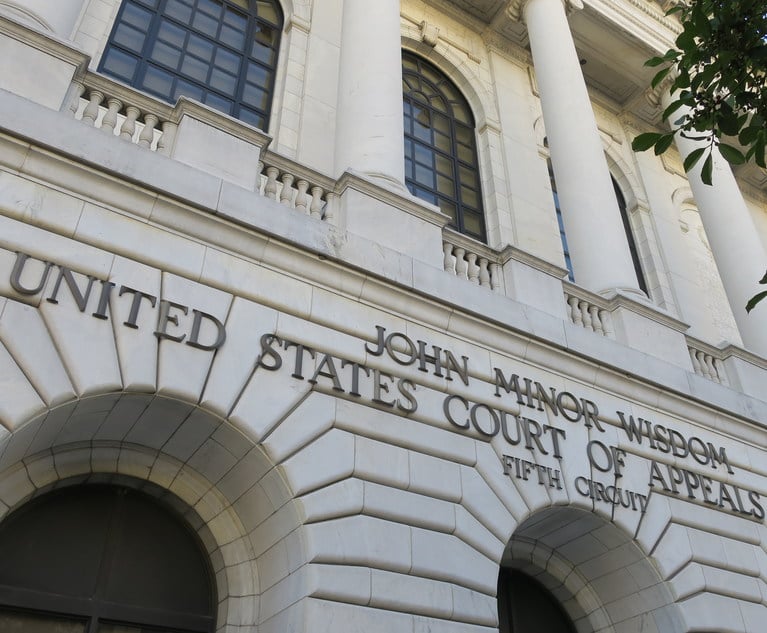Marcia Coyle Reports: Union Fees Get Fresh Look at High Court
Marcia Coyle, chief Washington correspondent at The National Law Journal, walks through some of the issues in Monday's big arguments in the union-fee case.
February 23, 2018 at 03:02 PM
3 minute read
Marcia Coyle, chief Washington correspondent at The National Law Journal, walks through some of the issues in Monday's big arguments in the union-fee case. This is the second time the issue of fair-share union fees is coming in front of the justices—the court deadlocked in an earlier case after the death of Antonin Scalia.
David Frederick of Washington's Kellogg, Hansen, Todd, Figel & Frederick will make the re-argument as counsel to AFSCME, and he's sharing time with David Franklin, the Illinois solicitor general. Arguing in support of the challengers: U.S. Solicitor General Noel Francisco and William Messenger of the National Right to Work Legal Defense Foundation, who represents Mark Janus.
We asked Frederick whether he's ever re-argued a case at the high court, and here's what he told us:
“Back in my SG days, I had to re-argue whether bank larceny is a lesser included offense of bank robbery under the federal criminal code. Spoiler alert: It isn't, by a 5-4 vote, with Justice Thomas writing and siding with our position. The first time the case came up, the defendant died of natural causes in prison after the argument but before decision. About two years later, the same federal defender got another case raising the exact same issue before the justices. Of course we didn't know the outcome of the first vote, but from the argument in the second case it was clear that the issue closely divided the court.”
And how might it feel going into Janus v. AFSCME—with predictions, from many observers, that Frederick will lose? Or at least face a really, really tough bench? Frederick says:
“I consider myself greatly honored to be in this position and am trying to present a better argument than I did last time.”
We'll have more on the arguments—and the week ahead—at Supreme Court Brief.
Read more:
Neil Gorsuch Won't Need an Introduction From This Advocate in Union-Fee Case
US Justice Department Takes Alito's Side in New Stance Against Union Fees
Kagan Questions US Solicitor's Absence in Labor Case
Union Fees Will Get Fresh Look at High Court, No Longer Deadlocked
This content has been archived. It is available through our partners, LexisNexis® and Bloomberg Law.
To view this content, please continue to their sites.
Not a Lexis Subscriber?
Subscribe Now
Not a Bloomberg Law Subscriber?
Subscribe Now
NOT FOR REPRINT
© 2025 ALM Global, LLC, All Rights Reserved. Request academic re-use from www.copyright.com. All other uses, submit a request to [email protected]. For more information visit Asset & Logo Licensing.
You Might Like
View All
4th Circuit Revives Racial Harassment Lawsuit Against North Carolina School District
3 minute read
Legal Issues to Watch in the US Appeals Courts in 2025

Second Circuit Upholds $5M Judgment Against Trump in E. Jean Carroll Case
4 minute read
Divided 5th Circuit Shoots Down Nasdaq Diversity Rules
Trending Stories
Who Got The Work
Michael G. Bongiorno, Andrew Scott Dulberg and Elizabeth E. Driscoll from Wilmer Cutler Pickering Hale and Dorr have stepped in to represent Symbotic Inc., an A.I.-enabled technology platform that focuses on increasing supply chain efficiency, and other defendants in a pending shareholder derivative lawsuit. The case, filed Oct. 2 in Massachusetts District Court by the Brown Law Firm on behalf of Stephen Austen, accuses certain officers and directors of misleading investors in regard to Symbotic's potential for margin growth by failing to disclose that the company was not equipped to timely deploy its systems or manage expenses through project delays. The case, assigned to U.S. District Judge Nathaniel M. Gorton, is 1:24-cv-12522, Austen v. Cohen et al.
Who Got The Work
Edmund Polubinski and Marie Killmond of Davis Polk & Wardwell have entered appearances for data platform software development company MongoDB and other defendants in a pending shareholder derivative lawsuit. The action, filed Oct. 7 in New York Southern District Court by the Brown Law Firm, accuses the company's directors and/or officers of falsely expressing confidence in the company’s restructuring of its sales incentive plan and downplaying the severity of decreases in its upfront commitments. The case is 1:24-cv-07594, Roy v. Ittycheria et al.
Who Got The Work
Amy O. Bruchs and Kurt F. Ellison of Michael Best & Friedrich have entered appearances for Epic Systems Corp. in a pending employment discrimination lawsuit. The suit was filed Sept. 7 in Wisconsin Western District Court by Levine Eisberner LLC and Siri & Glimstad on behalf of a project manager who claims that he was wrongfully terminated after applying for a religious exemption to the defendant's COVID-19 vaccine mandate. The case, assigned to U.S. Magistrate Judge Anita Marie Boor, is 3:24-cv-00630, Secker, Nathan v. Epic Systems Corporation.
Who Got The Work
David X. Sullivan, Thomas J. Finn and Gregory A. Hall from McCarter & English have entered appearances for Sunrun Installation Services in a pending civil rights lawsuit. The complaint was filed Sept. 4 in Connecticut District Court by attorney Robert M. Berke on behalf of former employee George Edward Steins, who was arrested and charged with employing an unregistered home improvement salesperson. The complaint alleges that had Sunrun informed the Connecticut Department of Consumer Protection that the plaintiff's employment had ended in 2017 and that he no longer held Sunrun's home improvement contractor license, he would not have been hit with charges, which were dismissed in May 2024. The case, assigned to U.S. District Judge Jeffrey A. Meyer, is 3:24-cv-01423, Steins v. Sunrun, Inc. et al.
Who Got The Work
Greenberg Traurig shareholder Joshua L. Raskin has entered an appearance for boohoo.com UK Ltd. in a pending patent infringement lawsuit. The suit, filed Sept. 3 in Texas Eastern District Court by Rozier Hardt McDonough on behalf of Alto Dynamics, asserts five patents related to an online shopping platform. The case, assigned to U.S. District Judge Rodney Gilstrap, is 2:24-cv-00719, Alto Dynamics, LLC v. boohoo.com UK Limited.
Featured Firms
Law Offices of Gary Martin Hays & Associates, P.C.
(470) 294-1674
Law Offices of Mark E. Salomone
(857) 444-6468
Smith & Hassler
(713) 739-1250










